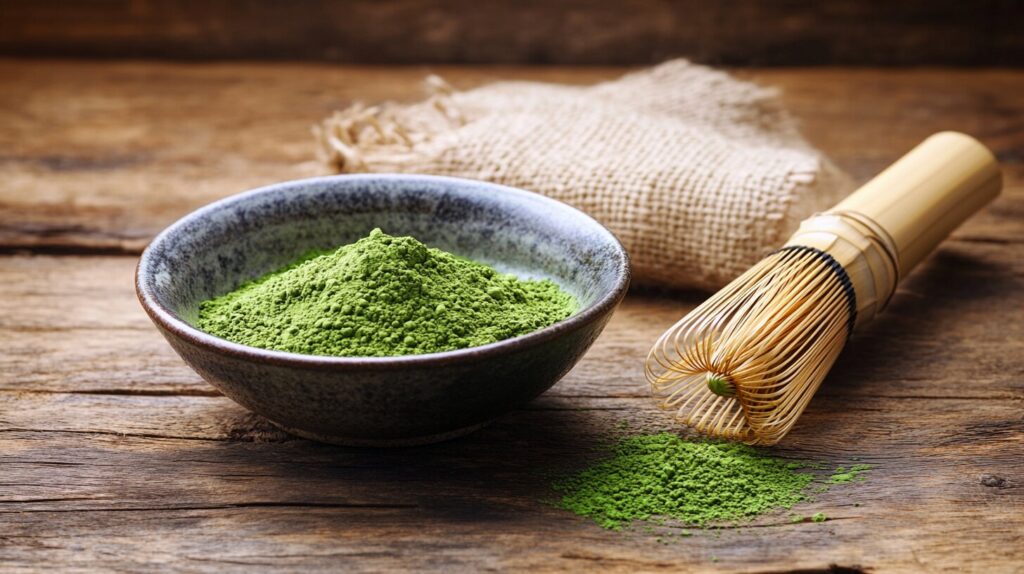Matcha has taken the world by storm as a health-boosting beverage, while almond milk continues to gain traction as a popular dairy alternative. With more people enjoying matcha lattes made with almond milk, many wonder: Is it OK to drink matcha with almond milk? The short answer is a resounding yes! But there’s more to this pairing than meets the eye. Let’s dive deep into the world of matcha and almond milk to explore their benefits, drawbacks, and everything in between.
Table of Contents
What is Matcha?

Matcha is a finely ground powder made from specially grown green tea leaves. Originating in Japan, it has played a significant role in traditional tea ceremonies for centuries. Unlike regular green tea, where the leaves are steeped and discarded, matcha involves consuming the entire leaf, maximizing its nutritional benefits. The cultivation process involves shading the tea plants before harvest to boost chlorophyll levels. This process gives matcha its vibrant green color and rich, umami flavor. If you’re curious about the numerous advantages this tea offers, check out our Health Benefits of Matcha for a deeper dive into why it’s so popular.
The Rise of Plant-Based Milks

Plant-based milks have grown tremendously in popularity over the past decade. Discover our Guide to Plant-Based Milks to explore various options and their benefits. This trend is driven by a combination of health, ethical, and environmental considerations. For a detailed breakdown of plant-based milk options, check out our comprehensive Guide to Plant-Based Milks. Many people are choosing to avoid dairy due to lactose intolerance, dairy allergies, or ethical concerns about animal welfare. Almond milk is one of the leading dairy alternatives due to its mild, nutty flavor and low-calorie profile. Learn more about almond milk and its baking potential in our guide on Substituting Almond Flour for All-Purpose Flour in Muffins. It is made by blending almonds with water and straining the mixture to remove the solids. Other popular plant-based milks include soy milk, oat milk, and coconut milk. These dairy-free alternatives are often fortified with essential nutrients like calcium and vitamin D to mimic the benefits of cow’s milk. The rise of plant-based milks reflects a broader shift towards sustainable and health-conscious living. Almond milk, in particular, has become a favorite for coffee and tea lovers due to its versatility and light texture.
Nutritional Profile of Matcha
Matcha is considered a nutritional powerhouse because of its concentrated nutrients. It is exceptionally rich in antioxidants, particularly EGCG (epigallocatechin gallate), which helps fight free radicals and reduce inflammation. Matcha contains high levels of L-theanine, an amino acid that promotes relaxation and mental clarity. Combined with caffeine, L-theanine provides a balanced and sustained energy boost, helping you stay focused without experiencing a crash. A serving of matcha also delivers essential vitamins and minerals, such as vitamin A, vitamin C, vitamin E, and potassium. Another key component of matcha is chlorophyll, which supports detoxification by helping the body eliminate harmful toxins. Because you consume the whole tea leaf when drinking matcha, you receive a higher concentration of these nutrients compared to traditional brewed green tea. These qualities make matcha a go-to beverage for health-conscious individuals.
Nutritional Profile of Almond Milk
Almond milk is a nutritious and versatile dairy alternative. Made by blending almonds with water and straining the pulp, almond milk is naturally low in calories, with unsweetened varieties containing about 30-50 calories per cup. It is often fortified with essential nutrients like calcium, vitamin D, and vitamin B12 to provide similar benefits to cow’s milk. Almond milk is also an excellent source of vitamin E, a powerful antioxidant that supports skin health and boosts immune function. Because it is naturally free of cholesterol and low in saturated fat, almond milk is heart-friendly. However, it is low in protein compared to dairy milk or soy milk, providing only about 1 gram of protein per cup. For those with dietary restrictions, almond milk is lactose-free, making it an ideal choice for people who are lactose intolerant or have dairy allergies. When choosing almond milk, opt for unsweetened versions to avoid added sugars.
Health Benefits of Drinking Matcha
Matcha offers a wide range of health benefits due to its rich nutrient profile. One of the most significant advantages is its high concentration of antioxidants, particularly EGCG (epigallocatechin gallate), which helps reduce inflammation and protect against cell damage. These antioxidants may help lower the risk of chronic diseases like heart disease and cancer. Matcha also provides a balanced combination of caffeine and L-theanine, which improves focus, mental clarity, and energy levels without the jitters associated with coffee. Additionally, matcha supports weight loss by boosting metabolism and promoting fat burning. Its high chlorophyll content aids in detoxifying the body by flushing out toxins. For more detailed insights into how matcha can benefit your health, be sure to check out our Health Benefits of Matcha.
Health Benefits of Almond Milk
Almond milk is not just a substitute for cow’s milk; it offers its own set of health benefits. One of its primary advantages is that it is low in calories, making it suitable for those looking to manage their weight. A cup of unsweetened almond milk contains only about 30-50 calories, far fewer than a cup of whole milk. Almond milk is also a good source of vitamin E, an antioxidant that helps protect the skin from damage caused by free radicals and supports a healthy immune system. Manufacturers often fortify commercial almond milks with calcium and vitamin D, essential nutrients for maintaining strong bones and teeth. Because it is naturally lactose-free, almond milk is an excellent choice for people with lactose intolerance or dairy allergies. Additionally, almond milk contains no cholesterol and is low in saturated fat, making it heart-friendly and beneficial for overall cardiovascular health.
Is Matcha with Almond Milk a Healthy Combination?
Yes, matcha with almond milk is a healthy and delicious combination that offers a range of benefits. Matcha is loaded with antioxidants, amino acids, and vitamins that boost energy, focus, and overall wellness. Almond milk adds to these benefits by providing vitamin E, calcium, and healthy fats without the calories or cholesterol found in dairy milk. Together, they form a nutrient-rich, low-calorie drink that is suitable for people with lactose intolerance or those following a vegan lifestyle. Since almond milk is naturally low in calories, it does not overshadow the health benefits of matcha. This combination is perfect for anyone looking for a dairy-free, plant-based beverage that promotes mental clarity, detoxification, and heart health. Whether you enjoy it hot or cold, a matcha almond milk latte is a satisfying drink that supports a balanced lifestyle.
Taste and Texture: What to Expect
When combined, matcha and almond milk create a delightful drink with a smooth, creamy texture and a balanced flavor profile. Matcha has a distinctive taste that can be described as earthy, grassy, and slightly bitter. On its own, some people find pure matcha too intense. However, almond milk softens matcha’s bitterness by adding a subtle nutty sweetness and a rich, creamy texture. The almond milk’s light consistency enhances the drink without making it feel heavy. This combination results in a well-rounded beverage that appeals to a wide range of tastes. When served hot, a matcha almond milk latte is warm and comforting. As an iced drink, it is refreshing and energizing. The balance of flavors and textures makes this pairing ideal for those who want a delicious and healthy alternative to coffee or traditional dairy-based lattes.
How to Make a Perfect Matcha Almond Milk Latte

Making a matcha almond milk latte at home is simple and satisfying. This creamy, dairy-free drink is both delicious and nutritious. For a step-by-step guide to creating the perfect latte, check out our Matcha Almond Milk Latte Recipe. Here’s a quick overview to get you started:
Ingredients:
- 1 teaspoon high-quality matcha powder
- 1 cup unsweetened almond milk
- 1 tablespoon hot water
- 1 teaspoon maple syrup, honey, or another sweetener (optional)
Instructions:
- Sift the Matcha: Sift 1 teaspoon of matcha powder into a bowl to avoid clumps. This step ensures a smooth, frothy latte.
- Whisk with Water: Add 1 tablespoon of hot (but not boiling) water and whisk using a bamboo whisk or electric frother until the matcha forms a smooth, frothy paste.
- Heat the Almond Milk: Warm 1 cup of unsweetened almond milk in a saucepan or microwave until it reaches your desired temperature.
- Froth the Milk: Use a milk frother or whisk to create foam in the almond milk.
- Combine: Pour the warm, frothy almond milk over the whisked matcha. Stir gently to combine.
- Sweeten (Optional): Add a teaspoon of maple syrup, honey, or your favorite sweetener for added sweetness.
- Enjoy: Serve hot, or pour over ice for a refreshing iced matcha latte.
- Garnish (Optional): For a little extra flair, sprinkle some matcha powder or cinnamon on top. This not only adds to the visual appeal but also enhances the flavor profile.
- Serve Immediately: Matcha is best enjoyed fresh, so sip and savor your homemade latte right away for the best taste and texture.
This simple recipe allows you to enjoy a barista-quality matcha latte at home. You can customize it by adjusting the sweetness or experimenting with different flavors, such as adding a dash of vanilla extract or a sprinkle of cocoa powder. The creamy texture of almond milk complements the earthy notes of matcha perfectly, creating a delightful beverage that can be enjoyed at any time of the day. Whether you need a morning pick-me-up or an afternoon treat, this matcha almond milk latte is a satisfying and nutritious option.
Potential Downsides of Drinking Matcha with Almond Milk
While matcha with almond milk is generally a healthy and delicious choice, there are a few potential downsides to consider. One concern is the presence of additives in store-bought almond milk. Many commercial brands contain added sugars, preservatives, and stabilizers to enhance flavor and shelf life. These additives can undermine the health benefits of the drink. To avoid this, choose unsweetened almond milk with minimal ingredients. Another consideration is nut allergies. If you are allergic to nuts, almond milk is not a safe option, and you should consider alternatives like oat milk or soy milk.
Additionally, matcha contains caffeine, which can be problematic for individuals sensitive to stimulants. Consuming matcha in the evening may interfere with sleep patterns, so it’s best enjoyed earlier in the day. While matcha provides a gentler energy boost compared to coffee, excessive consumption can still lead to jitteriness or digestive issues. Another downside is the environmental impact of almond farming. Growing almonds requires significant water resources, which raises concerns about sustainability. Being mindful of these factors and making informed choices can help you enjoy matcha with almond milk while minimizing any potential drawbacks.
Frequently Asked Questions About Matcha and Almond Milk
Can I drink matcha with almond milk every day?
Yes, it’s generally safe and beneficial to drink matcha with almond milk daily. However, be mindful of your overall caffeine intake and choose unsweetened almond milk to avoid added sugars.
Does almond milk reduce the effectiveness of matcha?
No, almond milk does not reduce the health benefits of matcha. In fact, it adds nutrients like vitamin E and calcium, making the combination even more beneficial. If you’re looking for a healthy and delicious baked treat, try our Matcha Muffin Recipe with Almond Flour.
What’s the best almond milk for making matcha lattes?
Unsweetened, fortified almond milk is the best choice for matcha lattes. It keeps the calorie count low and provides essential nutrients like calcium and vitamin D.
Can I use other plant-based milks instead of almond milk?
Absolutely! Other plant-based milks like oat milk, soy milk, and coconut milk work well with matcha. Each offers a unique flavor and texture to suit your preferences.
Is matcha with almond milk good for weight loss?
Yes, matcha with almond milk can be a great addition to a weight-loss diet. Matcha boosts metabolism and fat burning, while almond milk is low in calories. Just be sure to avoid adding excessive sweeteners.
How much caffeine is in a matcha almond milk latte?
A typical matcha almond milk latte contains about 70 milligrams of caffeine per teaspoon of matcha powder. This is less than a cup of coffee, making it a good alternative for a milder energy boost.
Conclusion: Should You Drink Matcha with Almond Milk?
Drinking matcha with almond milk is not only OK—it’s a fantastic choice! This combination offers a variety of health benefits, from antioxidants and amino acids to vitamins and minerals. The pairing is perfect for those seeking a low-calorie, dairy-free beverage that promotes energy, focus, and overall wellness. Whether you’re a seasoned matcha drinker or new to this green tea powerhouse, a matcha almond milk latte is a delicious and nutritious addition to your daily routine. For more information on different milk alternatives, refer to our Guide to Plant-Based Milks.
Enjoy your matcha almond milk latte and reap the benefits of this amazing duo!
